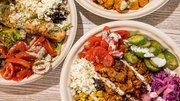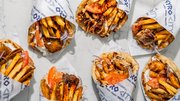Article
Salata’s growth driven by consumer demand for clean eating
Guests also want more vegetarian proteins, such as quinoa, tofu and falafel, as well as sauces and spices.

June 20, 2014 by Alicia Kelso — Editor, QSRWeb.com
In 2003, Berge Simonian was the franchise owner for a restaurant concept in Houston when he noticed a trend – the salad platform was growing faster than anything else on the menu, and by a lot. He decided to branch off on his own and create a brand focusing on salads, dressings, sauces and soups. Consequently, the first Salata location opened in the fall of 2005.
There are now more than 32 units in Texas and California, with Chicago on the horizon. Another 15 Salatas are expected to open by the end of this year, according to David Laborde, director of product development.
Laborde said the expansion is accelerating and is driven mostly by demand for customization, which is offered at the salad bar-like concept.
“Consumers now want what they want; they want it their way. Our momentum is behind that customization, but also behind more brand exposure and quality,” he said.
There are a handful of similar concepts, and Laborde has been tasked with competing through quality, he said. To do so, the brand has a central commissary where all of the soups and dressings are made, and is growing this space by the end of the year.
“The commissary gives us tight control over it all. It’s not packaged from Sysco or someplace like that. We hand pick our oregano, use five different lettuces and 50 different toppings. When I look for new products, I have to consider what has a clean label; what shines on its own. We’re leveraging that healthy, clean trend and guests want that,” Laborde said.
Menu trends
Aside from healthy, clean and customization, Laborde said there are other menu trends working their way into the spotlight. For example, based on consumer demand, Salata has been experimenting with more vegetarian proteins, such as quinoa, tofu and falafel. Sauces and spices are also hot right now.
“Our grilled chicken is tossed in four sauces. And the spicy trend isn’t just hot-spicy, it’s North African spices, Indian spices – profiles like that,” Laborde said.
Salata is also fine-tuning its fledgling LTO strategy. The first limited-time launch was in the fall – turkey. Laborde said it was both popular and easy to implement operationally, so it is now permanent. This past spring featured the Fresh from the Field promotion.
“The Fresh from the Field introduction was a way for us to reinvigorate the menu, and a way for us to put asparagus out there. It played into seasonality and it was exciting,” he said. His goal is to have two LTOs a year because it “keeps guests loyal.”
“We have huge loyalty – guests that come in three or four times a week. They’ve helped us grow and we need to cater to them,” he said.
Beverages
Those loyal guests also want unique beverages, which has been another focus for the product development team. Salata plans to launch half gallon teas and flavored lemonades, such as peach, green tea and raspberry. The team has also looked at waters and other “healthier, flavored” beverages.
“We are looking into consolidating a beverage program because we know a lot of profit can be made there. But we have to do it right. We don’t feel that fountain drinks fit in with our brand, but sometimes our customers want a Diet Coke. So we're looking at something like Maine Root soda, which uses pure cane sugar. Our custom teas generate a great profit, and they go with the brand. We need to stay consistent,” Laborde said.
Catering
Salata also offers a catering menu, with box lunch versions of its signature salads, wraps and soups. Laborde said catering currently makes up about 2 percent of sales at the moment and the company is looking at ways to grow the service.
“Catering is a huge challenge to scale. It’s challenging to find the right packaging vehicle. We are looking for a custom piece of packaging to get that compartmentalized, so customers can get what they want just like they do at a restaurant,” he said.
In the meantime, the small team at Salata is focused on growing its footprint and revenue channels in other ways, and Laborde said 2015 should be a banner year. The company is moving into new offices in Houston in the fall that will include a 20,000-square-foot commissary and a small restaurant for training.
“We’re now amping up our training team and building our infrastructure. We want to grow smartly,” Laborde said. “And I think we’re ready.”












